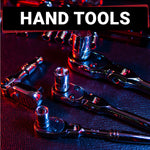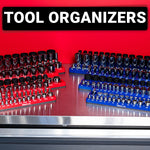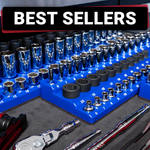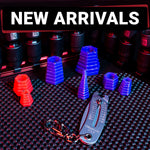For impact tools, avoid regular chrome sockets that can shatter under stress. Impact sockets are the heavy hitters in a mechanics socket collection. Their thick walls and tough material resist the constant stress of impact tools so you can break loose the tightest fasteners.
We’ll break down everything you need to know about impact socket sets—types, sizes, materials, and real-world uses—so you can choose the best set for your needs.
Impact Socket Features To Look For
You can find plenty of great impact socket sets on the market, but they’re not all the same. Evaluate your job needs to pick the set that matches your work style. Think about these socket features when you are choosing your next set.
Material
Impact sockets absorb tremendous force. Don’t cheap out on the construction material. Low-quality impact sockets might be made of chromium-vanadium (Cr-V) steel. That’s fine for regular sockets, but for impact sockets, choose chromium molybdenum (Cro-Mo) steel. Cro-Mo impact sockets have significantly higher tensile strength and impact strength than Cr-V sockets, which can shatter when used with impact tools.
Point count
Sockets typically come in 6-point and 12-point versions (the number of points that form the internal shape). For impact tools, use 6-point sockets. A 6-point design hugs the fastener from all edges for a secure grip. This keeps fasteners from getting stripped and protects your tool from slipping. 12-point sockets work for lower-impact jobs. These sockets can access fasteners are more angles.
Socket type
Basic impact sockets come in deep, shallow, and stubby versions, ranked from longest to shortest. For general work, choose deep sockets since their longer shaft can fit over long and short bolt ends. If you do a lot of work with short fasteners or in cramped spaces, shallow or stubby impact sockets provide access and better control.
Shop our stubby impact sockets.
Flexibility
You can still use an impact gun on fasteners at awkward angles. Universal joint and swivel impact sockets feature a pivot point that lets you flex the socket head up to about 30 degrees.
The terms are sometimes used interchangeably, but a universal joint impact socket is oftentimes synonymous with a universal adaptor. You attach the adaptor to your impact gun and then attach a regular impact socket to the adaptor. The advantage is that you can buy one adaptor and use your regular impact socket set.
Swivel impact sockets are sizes like regular sockets and attach to the impact gun. Each socket has a pivot point. Swivel sockets are better than universal joint adaptors because they are more stable. Since the pivot point and the socket are one mechanism, nothing can slip off during use.
Shop our Swivel impact sockets.
Markings
Quality sockets should have size markings etched into the walls. Avoid sets with painted markings since they will rub off and you’ll be left playing guessing games. You can also shop for sets that include a socket organizer. It keeps your sockets ranked by size and often includes painted, etched, or raised size markings for quick selection.
Drive Sizes
Impact socket drive sizes fit certain bolt size ranges and torque demands. The drive size determines how much force your impact wrench delivers to the fastener.
- 1/4-inch drive impact sockets fit small fasteners in tight spaces. These compact sockets remove small bolts on interior trim, electronics housings, and delicate assemblies.
- 3/8-inch drive impact sockets tackle most automotive repairs and maintenance tasks. This size removes brake caliper bolts, valve covers, intake manifolds, and suspension components.
- 1/2-inch drive impact sockets deliver high torque for stubborn and heavy-duty fasteners. Professional mechanics use these for lug nuts, axle bolts, frame bolts, and frozen suspension parts.
- 3/4-inch drive impact sockets serve industrial and heavy equipment applications. These large sockets remove wheel bearings on semi trucks, agricultural equipment, and construction machinery. The massive drive size generates extreme torque for the biggest frozen bolts.
Most DIY mechanics start with a 3/8 or 1/2-inch drive set. These sizes cover common automotive repairs without the extra bulk of larger drives or the limited torque of 1/4-inch drives.
Additional Accessories Included in Socket Sets
Many impact socket sets come with extra tools that improve functionality and adaptability. These accessories help mechanics handle fasteners in hard-to-reach places or work on different drive sizes without switching tools.
- Extension bars: reach bolts deep inside engine bays or behind suspension components.
- Adapters: allow sockets to work with different drive sizes for better compatibility with multiple wrenches.
- Magnetic holders: keep sockets securely in place during work and storage.
Try our 1/2-inch deep impact socket set with a magnetic organizer to beef up your high torque collection.
Top Brands for Impact Socket Sets
The right socket set will last through years of automotive work and save money on replacements. Here are some of the brands to shop for.
- Craftsman
- DeWalt
- Milwaukee
- Snap-On
- Sunex
- Olsa Tools
At Olsa Tools, we deliver machine-shop quality at direct pricing. Our Cro-Mo, 6-point impact sockets get the job done, again and again. They work so hard that you might consider adding them to the payroll. And if not, we offer a 90-day money-back guarantee. We also offer a limited lifetime warranty on our sockets and the rest of our inventory.
“This was my 8th or 9th set of tools I have purchased from Olsa. I could not be more pleased with the performance, quality, & packaging of what I have purchased. Where other socket brands want to round off a worn nut, Olsa sockets hold fast. Where other adjustable wrenches want to be “loose” and round a nut or head, Olsa adjustable wrenches hold firm. Quality Products. Quality Service. I prefer doing business with our cousins up north anyway.”
—Ron L. (verified buyer of Cr-Mo Impact Socket Sets, five-star review)
Impact sockets FAQ
How long do impact sockets last?
Quality impact sockets last through years of professional auto repair. The thick steel walls resist cracking and deformation even after thousands of uses with impact wrenches. Many mechanics pass down their original socket sets through decades of daily work.
Here are the main factors that affect the lifespan of your impact sockets:
- Use the correct size socket to prevent stress on the walls and drive square.
- Keep sockets clean and rust-free to maintain proper fit on fasteners.
- Store sockets in organized trays to stop them from banging together in toolboxes.
- Choose high-quality as they outlast cheap impact sockets for many years.
How should I store and organize impact sockets?
Your impact sockets need a home in your toolbox. The right storage system puts every socket at your fingertips instead of being buried in a drawer or lost under a car. Professional mechanics trust their socket sets for tough jobs, which means organizing them smartly.
Here are some ideas:
- Rail organizers: Aluminum rails hold sockets in a single row for quick access. The clips keep sockets secure but pop off easily when needed. You can mount rails to walls or lay flat in toolbox drawers. Olsa Tools offers socket rails in multiple colors with metric, SAE, or combined size markings.
- Magnetic socket holders: Strong magnetic strips grip sockets firmly in 2 or 3 organized rows. These holders stick to any metal surface: toolbox walls, shop carts, or vehicle frames during repairs. Olsa's magnetic socket holders include size markings and fit all socket types including impact sets.
- Socket trays: Molded plastic trays sort your favorite sockets by size and drive type. Each socket has its own labeled spot, so missing tools stand out instantly. These trays stack neatly in toolbox drawers. Olsa makes deep trays that hold standard and deep well sockets together.
- Portable cases: Socket cases with foam-lined compartments pack easily in your truck for mobile repairs. The sturdy build and snug fit keep your impact sockets safe on bumpy roads or busy job sites.
- Socket clips: Individual clips attach to socket rails or organize loose sockets. They snap firmly onto drive ends to keep sets together. Clips work well for frequently used socket combinations or quick grab-and-go repairs.
What makes chrome molybdenum alloy steel preferable for impact sockets?
Chrome molybdenum alloy steel provides exceptional durability through its unique material properties. This durable material undergoes special heat treatment to achieve peak strength for heavy-duty applications. Unlike basic Cr-V steel, it resists deformation under high stress, providing long-lasting performance for professional tool users.
Do I need a complete master impact socket set for DIY projects?
Most DIY enthusiasts don't need a master impact socket set. Start with a set that covers common sizes in standard and deep impact sockets. This gives you a broad range of capabilities without overspending. You can always add specialized tools like universal joints or extra-long impact sockets as specific needs arise.
Is a 6-point or 12-point impact socket better?
6-point impact sockets spread the force across flat surfaces of the bolt head, reducing the risk of rounding off fasteners. The solid grip works better for breaking loose stubborn bolts. 12-point sockets offer more positions to engage a bolt but can slip under high torque.
What are the best sockets in the world?
The best in the world are USA, German, and Japanese-made sockets. Olsa Tools delivers a range of impact sockets at lower prices because we sell directly to customers without expensive truck distribution costs. Plus, our reliable impact socket sets (and all other tool that we offer) come with a limited lifetime guarantee and a completely-risk free trial period.
What is the difference between a deep impact socket and an impact socket?
Deep impact sockets feature an extended length to reach nuts on long bolts or studs. Standard impact sockets have shorter walls for better access in tight spots. Both types use the same thick-wall construction to handle impact forces.
Are heavier impact sockets better?
Socket weight doesn't determine quality. The steel composition, heat treatment, and manufacturing precision matter more than weight. Some manufacturers add extra material unnecessarily. A well-made socket focuses on proper wall thickness in stress areas rather than overall mass.
How do you clean impact sockets?
Dirty impact sockets don't grip bolts properly. Spray them with a degreaser to cut through grime, then wipe them down with tool wipes. If rust appears, scrub it off with steel wool and add a thin coat of oil to protect the metal surface.
Do I need socket adapters with my impact set?
Socket adapters let you use different drive sizes with your impact wrench, but only use impact-rated socket adapters. Regular chrome adapters can snap under high torque, creating dangerous situations.
What are impact sockets used for?
Impact sockets attach to impact wrenches and other power tools to perform these common tasks:
- Automotive maintenance including brake work, suspension repairs, and engine repairs
- Professional mechanics work with air-impact guns in auto shops
- Construction and industrial applications requiring high torque levels
- Breaking loose severely rusted or overtightened fasteners
- Installing and removing wheel nuts on cars and trucks
- Working with larger sizes of bolts and nuts in industrial settings
- Heavy-duty applications on construction sites and manufacturing facilities
- Removing and installing fasteners on heavy equipment and machinery
- Tasks that require constant torque application across multiple fasteners
- Heavy-duty tasks, like removing stubborn lug nuts and frozen bolts on vehicles
Choose impact sockets made from chrome molybdenum alloy steel with a black oxide finish for maximum durability and long-lasting performance. Remember that regular chrome sockets should never be used with impact tools, as they can shatter under stress.
What's the difference between an impact gun and an impact wrench?
The terms "impact gun" and "impact wrench" refer to the same tool, often used interchangeably depending on regional or industry terminology. Both deliver the same hammering action that impact sockets are built to handle.
Why do my impact sockets feel loose sometimes?
Impact-rated socket sets can feel loose if dirt builds up between the socket and fastener. Clean your sockets regularly for solid, long-lasting performance. Also, check that you're using the correct socket size and drive type for your application.
When should I choose shallow impact sockets over deep wells?
Shallow impact sockets work best in tight spots where deep wells won't fit. They also provide better control on shorter bolts since there's less socket wall to interfere with nearby components.








